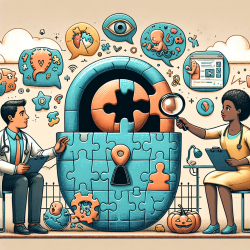As we navigate the complexities of the modern educational landscape, one theme persistently emerges: the need for adaptable, sustainable solutions in special education. The transition to remote work has not only been a necessity but has also opened doors to innovative approaches to therapy and mental health support. As a Special Education Director with years of experience, I've witnessed firsthand the transformative potential of online therapy in our schools, particularly as we grapple with the challenges of burnout among educators and therapists.
The shift towards working from home has underscored the importance of mental health, both for our students and the professionals dedicated to supporting them. In this digital age, online therapy emerges not just as a tool but as a vital resource in ensuring the continuity and quality of special education services. This transition, while challenging, offers a beacon of hope and a testament to the resilience and adaptability of our educational community.
Understanding the Burnout Phenomenon
Burnout among special education professionals is a growing concern, exacerbated by the global pandemic's challenges. The emotional and physical toll of adapting to ever-changing environments, coupled with the inherent demands of supporting students with diverse needs, cannot be overstated. It's a reality that calls for immediate attention and innovative solutions.
The Role of Online Therapy in Addressing Burnout
Online therapy stands at the forefront of this revolution, offering a flexible, accessible solution to the mental health challenges facing both educators and students. By integrating online therapy services into our schools, we not only provide essential support but also foster a culture of wellness and resilience. This approach not only aids in combating burnout but also ensures that our students receive uninterrupted, quality care.
Embracing the Work from Home Model in Special Education
The work from home model, necessitated by the pandemic, has presented both challenges and opportunities in special education. It has forced us to rethink how we deliver services and support our students and staff. Online therapy has been a game-changer in this respect, enabling continued learning and therapeutic intervention despite physical distance. This model has not only proven effective but has also provided unexpected benefits, such as increased flexibility and reduced stress for educators and therapists.
Maximizing the Potential of Online Therapy for Special Education
To fully harness the benefits of online therapy, it's imperative that we, as special education leaders, advocate for the necessary funding and resources. This includes ensuring access to high-quality digital platforms and training for educators and therapists. It's a call to action for special education funding agencies to invest in technology that supports mental health and combats burnout, ensuring a brighter future for both our students and those who dedicate their lives to teaching them.
Conclusion
The integration of online therapy into special education is more than a temporary solution; it's a transformative approach that promises to reshape our educational landscape. By addressing the mental health needs of both students and educators, and providing a viable solution to the issue of burnout, we are laying the groundwork for a more resilient, adaptive, and inclusive educational system. As we move forward, let us embrace the possibilities that online therapy offers, ensuring that no student or educator is left behind in our pursuit of excellence in special education.
As Special Education Directors, we are not just administrators; we are leaders in a movement towards a more accessible, equitable, and healthy future for special education. It's a journey that requires courage, innovation, and collaboration. Together, with the support of funding agencies and the embrace of online therapy, we can navigate the challenges of today while building a stronger foundation for tomorrow.










